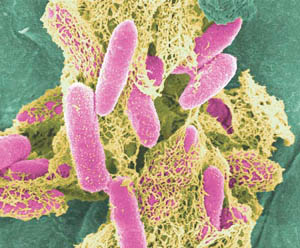Researchers at the Polytechnic Institute in Worcester discovered that unique compounds present in the juice somehow prevent the bacteria from sticking to the wall of the urinary tract

The researchers used an atomic force microscope - with extremely high resolution - and other sophisticated equipment to study how a group of tannins, called proanthocyanidins, found mainly in cranberries, communicate with the bacteria at the molecular level. They discovered that the compounds prevent the E. coli from attaching to cells in the body (an essential first step in causing infections) in several ways. For example, the chemical changes that these compounds cause to the bacterium create an energy barrier that prevents the bacterium from approaching the wall of the urinary system.
In addition, direct measurements showed that the adhesion force of the bacterium to the cells of the urinary tract wall decreases significantly in the presence of cranberry juice. The researchers also discovered another mechanism: they noticed that the cranberry juice prevents the islet from producing a molecule called IAA, a molecule involved in a phenomenon called quorum sensing. The term quorum refers to the minimum number of participants in a meeting needed to make binding decisions. Using the molecule, the bacterium allows other bacteria of its kind to know that it is there, and to sense when the population of bacteria of its kind is large enough to start creating an infection. Preventing the production of the molecule may be another way by which the tannin compounds succeed in inhibiting the bacteria's ability to cause serious infections.
These findings are of great importance, since the E. coli bacteria is responsible not only for urinary tract infections, but for a variety of diseases, from kidney infections to digestive tract problems. Now, the next goal of the researchers is to estimate what is the minimum necessary dose of cranberry juice (or tannins) and the optimal frequency necessary to prevent infections.
